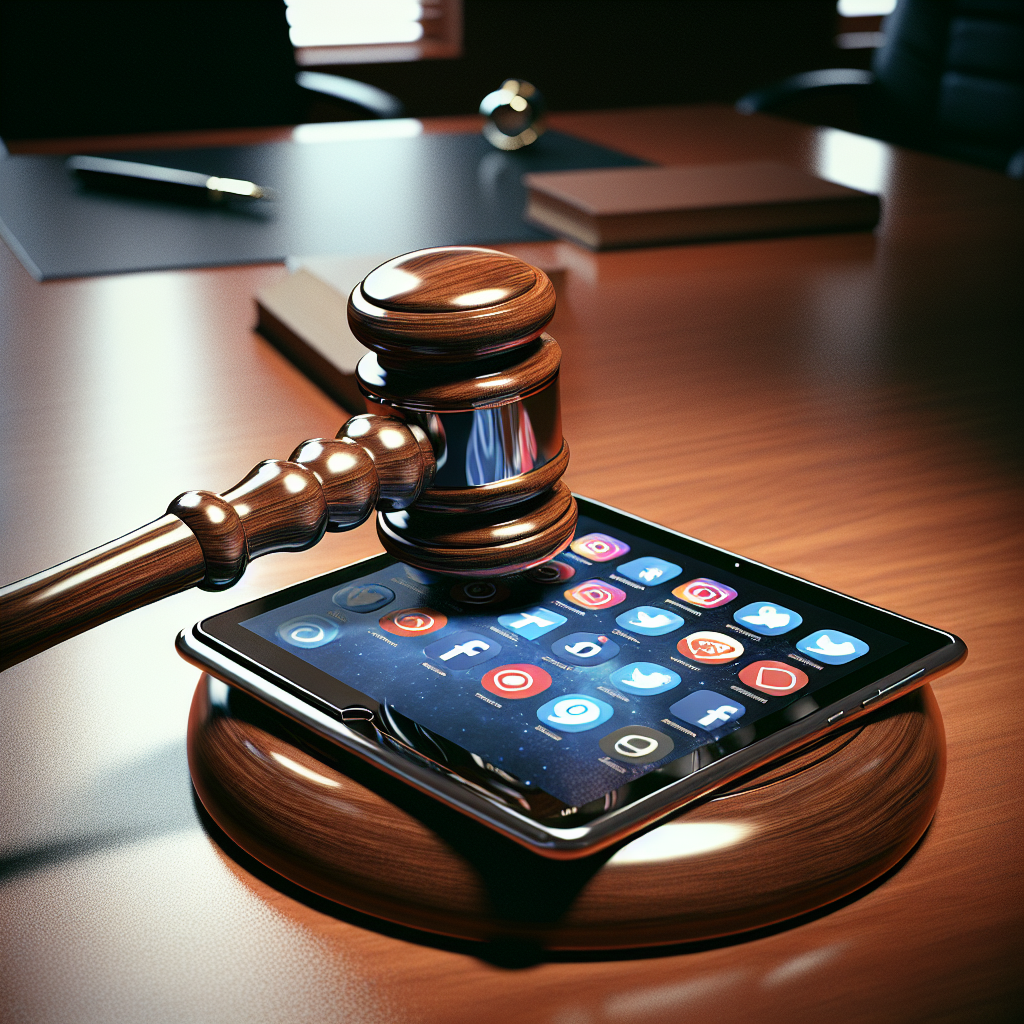Understanding the Link Between Social Media and Personal Injury Cases
Impact of Social Media on Personal Injury Lawsuits
Social media has increasingly garnered attention in recent years as a factor that could influence personal injury cases. Essentially, the content you post on platforms like Facebook, Twitter, Instagram, and others can be used as evidence in a court of law. Lawyers and insurance companies scan these social media pages to gather information that could potentially contradict the claims made by an injured party.
For instance, if you claim severe injuries from an accident preventing you from performing certain activities, yet there are pictures or comments posted of you doing just those activities, it could damage your credibility and the overall strength of your case. Therefore, it’s essential to understand that what may seem like a harmless post can significantly impact your legal battle over damages or compensation.
The Legal Perspective: Social Media as Evidence
From a legal perspective, anything you share on social media is public domain, making it admissible as evidence. The courts generally regard social media posts as self-representations that one willingly shares with others. Consequently, these posts can be used to demonstrate inconsistencies in your testimony or to refute the severity of your injuries. It’s important to remember that even deleted posts can often be recovered and used in court; therefore, the effects of social media use on a case should not be underestimated.
Even the posts of your friends and family can be used against your case. If they share information about your injuries or activities on their accounts, this too can serve as evidence that could undermine your claim.
Navigating Social Media during a Personal Injury Case
Given the potential negative impact of social media on a personal injury case, it’s prudent to exercise caution while your lawsuit is ongoing. Avoid posting about your accident, injuries, or recovery progress. Be aware of your privacy settings but remember, even with the highest level of privacy enabled, your posts can still be accessed and used in court.
Overall, while social media is an integral part of modern life, being aware of its potential implications in a legal context, particularly during a personal injury case, is crucial. Rethink what you share online, as it may not only influence public opinion but also the outcome of your lawsuit.
The Negative Impact of Social Media Posts on Your Claim
Content Verification: Twisting the Narrative
When you post on social media about your personal injury case, it is not just your friends or followers who will be reading. Insurance companies and defense attorneys can also access this information. A seemingly innocent post can be taken out of context or misconstrued to paint a picture that doesn’t accurately reflect the severity of your injuries or the impact on your life. Even if you have privacy settings in place, legal teams can request access to social media posts through court orders.
Discrepancies in Claimant’s Story
Social media posts can bring forth contradictions in your claim. For instance, if you’ve claimed for severe back injuries but post pictures at a yoga class or lifting heavy objects after the supposed injury, your credibility might be questioned. Not only can this weaken your claim, but it could also lead to its outright denial. Always remember, insurance companies are typically scouring for information that could minimize or debunk your claim.
Emotional Distress Claims and Social Media
Claims for emotional distress can be significantly affected by social media posts. If the victim claims suffering emotionally, yet they post pictures or updates of them enjoying social activities, insurance adjusters and the defense team can use this as evidence against the alleged emotional distress. In such scenarios, it becomes difficult to convince the jury of the emotional toll the incident has taken.
In conclusion, every post, like and comment you make on social media platforms are potential evidence that could hurt your personal injury claim. While it may seem harmless to share your personal life online, it is crucial to consider the potential negative implications it could have on your ongoing legal matters.
Legal Implications: How Courts Interpret Social Media Content
Understanding the Admissibility of Social Media Content
There are various legal ramifications with respect to how courts interpret social media content. Primarily, the admissibility of posts from platforms such as Facebook, Instagram, Twitter, LinkedIn, and other networking sites is at the discretion of the court. To be considered for admission, the content must be relevant to the claims or defenses of the lawsuit. The party wishing to use the material has the responsibility to authenticate it, proving that it is indeed linked to the person in question. Courts usually evaluate the credibility of evidence associated with social media by cross-verifying content with additional sources, timestamps, and contextual clues.
The Role of Privacy Settings in Judgement
Privacy settings have been a point of contention in numerous cases involving social media content. While users might assume their content is protected if their account is set to private, courts often rule that there is no reasonable expectation of privacy on social media. Hence, even ‘private’ posts may serve as admissible evidence in a personal injury case. Courts generally view these platforms as public spaces and perceive any shared information, regardless of privacy settings, as potentially accessible by third parties.
Interpretation of Social Media Evidence
It’s essential to understand that judges and juries interpreting social media content may not always have the full context or understanding of references, tone, or implications within posts. As a result, out of context text messages, tweets, or status updates can sometimes lead to misinterpretations. For this reason, attorneys may need to provide necessary explanations or clarifications about the nature of social media exchanges. They may also bring in expert witnesses to explain internet specific language or cultural references, providing necessary clarity to the court.
Tips to Protect Your Personal Injury Claim from Social Media Pitfalls
Understanding the Impact of Social Media in Legal Matters
Social media platforms can significantly impact your personal injury case. Posts, likes, comments, activities you participate in, or instances you are tagged in, can all potentially harm your claim. Law firms and insurance companies often scour these platforms in an attempt to find evidence that may contradict your injury allegations. Hence, it is crucial to understand and regulate your social media usage during the course of your claim.
Regulate Your Social Media Activity
The first and most effective strategy to safeguard your claim from social media pitfalls is to limit your online activities. Refrain from discussing your injury case on any platform, as this could provide information others might use against you. Temporary deactivation of accounts until the resolution of the case can be a wise move. If deactivation isn’t feasible, try to minimize your posts and shares, especially those related to your physical activities and emotional status.
Privacy Settings and Online Interactions
Ensure your privacy settings are configured to the highest level. This action will prevent strangers from viewing or interpreting your online activity. Moreover, inform friends and family not to post anything about you or your case while it’s ongoing. Remove any past posts that might negatively influence your case. In addition to this, avoid accepting new connection requests during this period as law firms or insurance companies might make fake profiles to access your information.
In conclusion, while social media has become an integral aspect of our lives, it is essential to exercise caution during a personal injury claim. Understand the implications of online activity, limit social media usage, enhance privacy settings, and control your online interactions to protect your personal injury claim from social media pitfalls.
Real-World Examples: Social Media Sabotaging Personal Injury Cases
Posting Evidence Contradicting Claims
Several instances have been recorded where social media posts contradicted personal injury claims. In one notable case, a woman filed a lawsuit for injuries sustained during a work incident, alleging she had severely hurt her back and was unable to resume work, leave her home or engage in any social activities. However, her social media profile told a different story, featuring posts of her participation in a local gym competition. This discrepancy severely undermined her claim and was used as evidence against her by the defense.
Sharing Information About the Accident
Another commonly observed issue is when litigants share details of their accident or injury on social media. A man once claimed for high financial compensation following a car accident, arguing that he was left unable to work or enjoy his hobbies, which included quad biking. Though he was initially successful in court, his case was jeopardized after photographs were discovered on his Facebook page showing him enjoying a day out quad biking post-incident. The images raised serious doubts about the extent of his injuries and as a result, his claim was significantly reduced.
Tagged Photos and Activities
Social media ‘tags’ can also create complications in personal injury claims. For example, a woman filed a lawsuit for a slip and fall incident at a supermarket, claiming immense physical pain and suffering. She argued it had led to significant changes in her lifestyle with a drastic reduction in physical activities due to the injury. While she refrained from posting anything online, her friends tagged her in several pictures showing her dancing at a party. Although the plaintiff may not have directly shared this information, she was still culpliced by these tags, raising questions about the validity of her claims.



